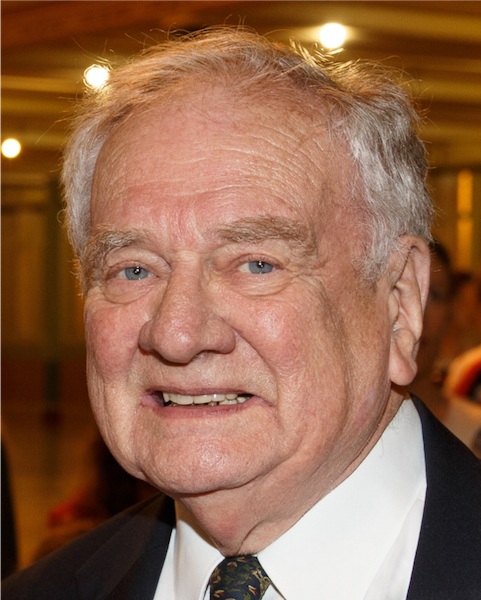Jubilee Fellow – 2015

Emeritus Professor John Poynter AO OBE
Chevalier dans l’Ordre des Palmes Academiques, MA (Oxford), BA, PhD (Melbourne), FAHA
2015 Reflections
The President has offered a range of topics for reflection, but I must begin with an apology. History is a discipline represented in two Academies, and as a member of both for more than forty years my memories of their early years overflow too easily from one to the other; and I must confess that in those four decades I was active in the Social Sciences for the first, in the Humanities for the second, and more or less inert—while respecting both—for the last two.
My interests were clearly in the social sciences when elected in 1971. I had enrolled in Arts in the University of Melbourne in 1948, when a three year Honours course was still the rule, enabling me to complete a History degree in Melbourne and another in Philosophy, Politics and Economics in Oxford in five years; but I returned to teach in Melbourne in 1953 having written nothing longer than a 3000 word essay. Part-time PhD enrolment followed, under the helpful but sceptical supervision of John La Nauze. Society and Pauperism: English Ideas in Poor Relief 1795-1834, my foray into the history of what was once called political economy, was completed when the welfare state was still under construction, and published in 1969. The debate over the proposed abolition of legal rights to poor relief, there recounted, has since re-emerged in the new discourse on welfare dependence and entitlements, sadly without Malthus, Ricardo and Bentham, the intellectual giants I had so much enjoyed exploring.
Vacations spent working in that field Canberra in the 1950s made me familiar with many members of both the Research Schools in the Coombs Building in the ANU, a relationship strengthened in 1966 when La Nauze translated to Sir Keith Hancock’s chair and I succeeded to his in Melbourne. But by 1971, when I was elected to the Academy, my research field had changed, to Australian foreign policy and related topics. International relations and their history had been an interest since student days in Melbourne, fostered by Norman Harper (another Foundation Fellow), and quickened by a term with AJP Taylor in Oxford and by teaching Modern European and British History in the 1960s. I spent most of 1968 shuffling archives in the basement of External Affairs, while provided with a room in the Coombs Building and residence in the house now occupied by the Academy’s Secretariat.
There were some remarkable scholars, senior and junior, in the new ASSA. What impressed me most was the readiness of so many to commit to major interdisciplinary efforts, including participation in Noel Butlin’s massive Botany Bay Project, Whitlamesque in scale. My contribution to the Academy was modest; from a stint as Chair of Section C I recall only my failure to persuade colleagues, especially the lawyers, that a study of the professions in Australia was a conceivable topic for research. My involvement with the social sciences culminated in 1978 in an invitation to join Clark Kerr in his review of the ANU’s Research School.
By then, however, I had fallen into university administration full-time, with the added responsibilities of Australian Secretary of the Rhodes Trust. Major research projects gave way to shorter pieces, chiefly for the Australian Dictionary of Biography, on characters ranging from a Scottish Governor-General to Helena Rubinstein. Increasing administrative responsibilities, in music —inherited, incidentally, from that highly cultured economist RI Downing—and for cultural policy generally, put me among the humanists again. It was only after retirement in 1995 that I could again tackle major projects, in institutional history and in larger-scale biographies of characters from the colourful world of colonial Victoria.
Having entered university administration when overseas students were seen as recipients of aid rather than sources of income, and worked with a vice-chancellor who insisted that the strong demand for places in Melbourne be kept confidential lest it embarrass newer institutions, I find the competitive self-promoting style required of modern universities as uncongenial as the intricacy of the regulations imposed on them—frustrations also invented internally, as size generated complexity. Fortunately, it seems, they are still capable of cooperation as well as competition. In this the Academies, with their independence and sense of a common purpose to present the values of scholarship to a society in danger of disillusion, must take the lead.
Of what (the President has asked) might I be proud? It is pleasing to have lived long enough to have had twenty years of productive ‘retirement’; to read recently that after fifty years Society and Pauperism ‘remains a classic study’; and to have written in my seventies a small volume of verse, mostly sardonic, and including a comment on earlier decades:
Asked of a man who gave up scholarship for administration
Where is the pottage?
I can see the mess.
Let us hope it is not beyond clearing up. Having watched impressive cohorts of young Australians interviewed for Rhodes and other scholarships, I have confidence in the next generation to do better than my own.